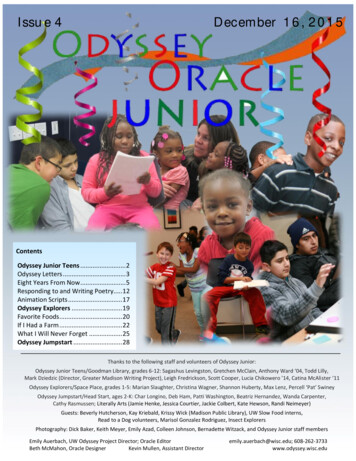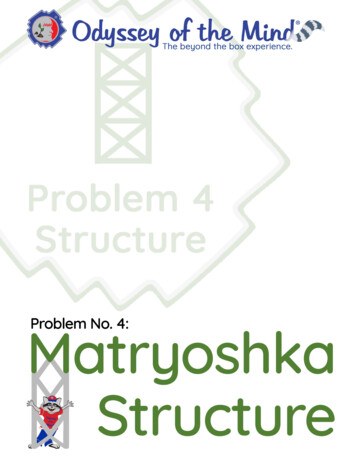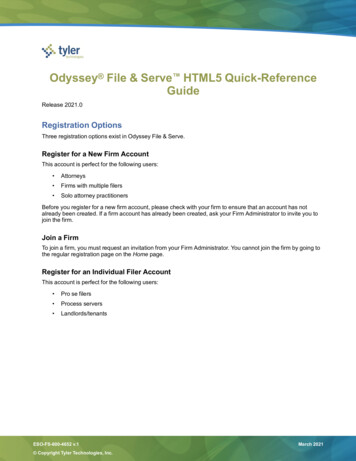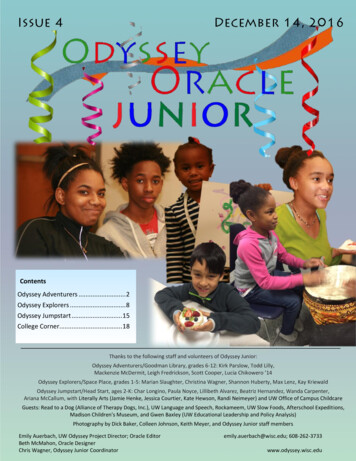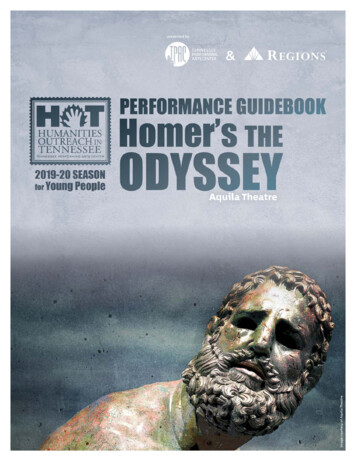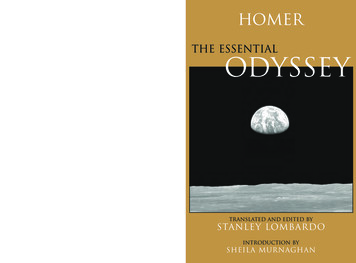
Transcription
homerThis generous abridgment of Stanley Lombardo’s translation of theOdyssey offers more than half of the epic, including all of its best-knownepisodes and finest poetry, while providing concise summaries for omittedbooks and passages. Sheila Murnaghan’s Introduction, a shortened versionof her essay for the unabridged edition, is ideal for readers new to thisremarkable tale of the homecoming of Odysseus.Comments on the Lombardo Odyssey“Lombardo has created a Homeric voice for his contemporaries: fresh,quick, and verbally engaging to the modern ear, as the original was to theancient. His characters come alive as real people expressing real feelingswith urgency and verve.”—JOSEPH RUSSO, Professor of Classics,Emeritus, Haverford College“The definitive English version of Homer for our time.”—THE COMMON REVIEW, The Magazineof the Great Books FoundationSTANLEY LOMBARDO is Professor of Classics, University of Kansas.9 780872 208995ODYSSEYstanley lombardo0899sheila murnaghanFnL1 00 0000Cover art: Earthrise, from the Apollo 11mission. Reproduced courtesy of NASAand the National Space Data Center.the essentialhackettSHEILA MURNAGHAN is Professor of Classical Studies, University ofPennsylvania.ISBN-13: 978-0-87220-899-590000the essential ODyssey“Lombardo has done it again: he has rendered the Odyssey into Englishjust as accurate, as perspicuous, and as gripping as that in his Iliad.Lombardo’s translation is enhanced by Sheila Murnaghan’s characteristically lucid and accurate Introduction, which will be a boon to teachers ofundergraduates (or even high school students).”—JOHN KIRBY, Professor of Classics andComparative Literature, Purdue Universitytranslated and edited by stanley lombardo“[Lombardo] has brought his laconic wit and love of the ribald . . . to hisversion of the Odyssey. His carefully honed syntax gives the narrativeenergy and a whirlwind pace. The lines, rhythmic and clipped, have thetautness and force of Odysseus’ bow.”—CHRIS HEDGES, The New York Times Book Reviewhomertranslated and edited byintroduction by
EHomer-00 Bk Page i Thursday, July 26, 2007 5:04 PMHomerThe Essential Odyssey
EHomer-00 Bk Page ii Thursday, July 26, 2007 5:04 PM
EHomer-00 Bk Page iii Thursday, July 26, 2007 5:04 PMHomerThe Essential OdysseyTranslated and Edited bySTANLEY LOMBARDOIntroduction bySHEILA MURNAGHANHackett Publishing Company, Inc.Indianapolis/Cambridge
Copyright 2007 by Hackett Publishing Company, Inc.All rights reserved12 11 10 09 08 071 2 3 4 5 6For further information, please address:Hackett Publishing Company, Inc.P.O. Box 44937Indianapolis, IN 46244-0937www.hackettpublishing.comCover design by Abigail Coyle and Brian RakInterior design by Meera DashPrinted at Edwards Brothers, Inc.Library of Congress Cataloging-in-Publication DataHomer.[Odyssey.English]The essential Odyssey / Homer ; translated and editedby Stanley Lombardo ; introduction by Sheila Murnaghan.p.cm.An abridgement of the translator’s ed. published in 2000under the title: Odyssey.ISBN 978-0-87220-899-5 –ISBN 978-0-87220-900-81. Homer—Translations into English. 2. Epic poetry,Greek—Translations into English. 3. Odysseus (Greekmythology)—Poetry. 4. Achilles (Greek mythology)—Poetry. 5.Trojan War—Poetry.I. Lombardo, Stanley, 1943- II. Title.PA4025.A15L66 2007883’.01—dc222007018788eISBN 978-1-60384-023-1 (e-book)
EHomer-00 Bk Page v Thursday, July 26, 2007 5:04 PMContentsHomeric Geography (map)viIntroductionixA Note on the Translation and on the AbridgmentSelections from the Odysseyxxv1Glossary of Names244Suggestions for Further Reading260v
EHomer-00 Bk Page vi Thursday, July 26, 2007 5:04 PMHOMERIC GEOGRAPHY (MAP)
EHomer-00 Bk Page vii Thursday, July 26, 2007 5:04 PM
EHomer-00 Bk Page viii Thursday, July 26, 2007 5:04 PM
EHomer-00 Bk Page ix Thursday, July 26, 2007 5:04 PMIntroductionThe Odyssey is an epic account of survival and homecoming. Thepoem tells of the return (or in Greek, nostos) of Odysseus from theGreek victory at Troy to Ithaca, the small, rocky island from whichhe set out twenty years before. It was a central theme of the Trojanlegend that getting home again was at least as great a challenge forthe Greeks as winning the war. Many heroes lost their homecomingsby dying at Troy, including Achilles, the greatest warrior of theGreeks, whose decision to fight in the full knowledge that he wouldnot survive to go home again is told in the Iliad, the other epic attributed to Homer. Others were lost at sea or met with disaster whenthey finally arrived home. The story of the returns of the majorGreek heroes was a favorite subject of heroic song. Within the Odyssey, a bard is portrayed as singing “the tale / Of the hard journeyshome that Pallas Athena / Ordained for the Greeks on their wayback from Troy” (1.343–45), and we know of an actual epic, nolonger surviving, that was entitled the Nostoi or “Returns” of theGreeks. The Odyssey is also a version of this story, and it containsaccounts of the homecomings of all the major heroes who went toTroy. But it gives that story a distinctive emphasis through its focuson Odysseus, who is presented as the hero best suited to the arduoustask of homecoming and the one whose return is both the most difficult and protracted and the most joyful and glorious.In telling this story, the poet has also given the greatest weight,not to the perilous, exotic sea journey from Troy, on the west coastof Asia Minor (present-day Turkey), to the shore of Ithaca, off thewest coast of Greece, but to the final phase of the hero’s return, hisreentry into his household and recovery of his former position at itscenter. As a result, the Odyssey is, perhaps surprisingly, an epic poemthat foregrounds its hero’s experiences in his home and with his family, presenting his success in picking up the threads of his previouslife as his greatest exploit. The Odyssey charges the domestic world towhich its hero returns with the same danger and enchantment foundin the larger, wilder realm of warfare and seafaring. Seen from theix
EHomer-00 Bk Page x Thursday, July 26, 2007 5:04 PMxIntroductionperspective of his wanderings, Odysseus’ home becomes at oncemore precious and more precarious. As he struggles to reestablishhimself in a place that has been changed by his twenty-year absence,we are made to reconsider, along with him, the value of the familiarand the danger of taking it for granted.A Tale of HomecomingThe Odyssey makes skillful use of the craft of storytelling to createthis emphasis on the final phase of Odysseus’ homecoming.Throughout the poem, Odysseus’ story is set against that of anothergreat hero of Troy, Agamemnon, whose own return failed just at thepoint when he reached his home. As the leader of the Greek expedition, Agamemnon seemed poised to enjoy the greatest triumph, andhe was able to make the sea journey back to the shores of his kingdom without much trouble. But in his absence his wife, Clytemnestra, had taken a lover, Aegisthus, who plotted to kill Agamemnonon his return, cutting him down just when he thought he could relaxhis guard and rejoice in his achievement. This story has the status inthe Odyssey of a kind of norm or model for what might be expected tohappen, and it is brought up at strategic moments to serve as a warning to Odysseus and his supporters, a repeated reminder that simplyarriving home does not mean the end of peril and risk.The importance of this final phase is also conveyed by theintricate structure of the Odyssey’s plot, which places stress on Ithacaand on Odysseus’ experiences there through the manipulation ofchronology and changes of scene. The action of the Odyssey begins,not with the fall of Troy as one might expect, but just a few weeksbefore Odysseus’ arrival at Ithaca ten years later. The poem openswith a divine council, in which the gods recognize that the fated timefor Odysseus’ return has finally arrived and take steps to set it inmotion. In the human realm, the urgency of this moment is moreacute on Ithaca, where events are moving swiftly in a dangerousdirection, than on Ogygia, the remote island where Odysseus istrapped with a goddess, Calypso, in a suspended state of inactivityand nostalgia that has been going on for seven years and could continue indefinitely. The plan the gods come up with has two parts:Athena will go to Ithaca to prompt Odysseus’ son, Telemachus, touseful action, and Hermes will go to Calypso and command her to
EHomer-00 Bk Page xi Thursday, July 26, 2007 5:04 PMIntroductionxirelease Odysseus; the poet chooses to narrate the Ithacan part first,giving priority to the situation and characters there. Thus, before wesee Odysseus in action, we are introduced to Odysseus’ household inhis absence, where his long years away have created a difficult situation that is now heading toward a crisis.All the young men of Ithaca and the surrounding region aretrying to take over Odysseus’ vacant position, staking their claims bysetting themselves up as suitors to Odysseus’ wife, Penelope. In thisrole, they spend their days feasting and reveling in Odysseus’ house,steadily consuming the resources of his large estate. Unable to sendthem packing, Penelope has cleverly held them at bay for threeyears, but they have discovered her ruses and their patience is running out. Meanwhile, Telemachus is just reaching manhood. Untilnow, he has been too young to do anything about the suitors, but hetoo is getting impatient with the unresolved nature of the situationand the constant depletion of his inheritance. Athena’s strategy is tospur him on to a full assumption of his adult role. She appears to himdisguised as a traveling friend of his father’s, Mentes, the king of theTaphians, and urges him to make a journey to the mainland, wherehe can consult two of the heroes who have returned from Troy,Nestor and Menelaus, in the hopes of finding out what has happenedto Odysseus.The aim of Telemachus’ voyage is, specifically, information thatmight help to clarify and resolve the situation on Ithaca but, morebroadly, education, the initiation into the ways of a proper heroichousehold that Telemachus is unable to find in his own fatherless,suitor-besieged home, and an opportunity for him to discover anddisplay his own inherent nobility. With the subtle guidance of Athena, who accompanies him, now in the disguise of Mentor, an Ithacan supporter of Odysseus, Telemachus first visits Nestor in Pylosand then Menelaus and his wife, Helen, in Sparta. From Menelaus,he receives the inconclusive news that Odysseus, when last heard of,was stranded with Calypso. But he also learns from both of his hostsabout the homeward journeys of all the major Greek heroes, andhears reminiscences about the father he has never met. He gains acompanion in Nestor’s son Peisistratus and has the experience ofbeing spontaneously recognized as Odysseus’ son.Thus the initial section of the Odyssey, which occupies the firstfour of its twenty-four books, is what is known as the “Telemachy,”
EHomer-00 Bk Page xii Thursday, July 26, 2007 5:04 PMxiiIntroductionthe story of Telemachus. It is only in the fifth book that we encounter Odysseus in person, as the poem begins again at the beginning,now offering an account of what has been happening to Odysseusduring the same time. The scene returns to Olympus, and the otherpart of the divine plan is put into action. Hermes is sent to freeOdysseus from Calypso, and a new eight-book section focused onOdysseus begins. This is a new beginning for Odysseus as well as forthe poem: in the episodes that follow, Odysseus has to create himselfanew, acquiring again all the signs of identity and status that wereonce his. With Calypso’s reluctant blessing, he builds a raft and setsoff across the sea, only to be hit with a storm by his great divineenemy, the sea-god Poseidon. He narrowly avoids drowning andmanages to reach the shore of Schería, a lush, isolated island inhabited by a race of magical seafarers, the Phaeacians. Through hisencounters with the Phaeacians, Odysseus gradually recovers hisformer status. He gains the help of the Phaeacian princess, Nausicaa,who provides him with clothes and directions, and he makes his wayto the court of their king, Alcinous, where he is welcomed andpromised transportation back to Ithaca. At a great feast at Alcinous’court, he is finally ready to identify himself, and he gives an accountof his adventures since leaving Troy. Thus the earliest part of theOdyssey’s story is actually narrated in the middle of the poem, in along first-person flashback that occupies Books 8 through 12.The experiences that Odysseus recounts are strange and fascinating: his visit to the land of the Lotus-Eaters; his risky confrontation of the one-eyed, man-eating giant, the Cyclops Polyphemus; hisbattle of wits with the enchantress Circe, who turns men into pigswith a stroke of her magic wand; his visit to the Underworld wherehe meets his mother, his comrades from Troy, and the prophet Tiresias, who tells him about a last mysterious journey before his life isover; his success in hearing the beautiful, but usually deadly, singingof the Sirens; the difficult passage between two horrific monsters,Scylla and Charybdis; and the ordeal of being marooned on theisland of the Sun God, where his starving crew make the fatal mistakeof eating the god’s cattle. These famous stories have many parallels inwidely disseminated folktales, with which they share an element ofmagic and an ability to convert basic human situations and concernsinto marvelous plots. They are so well told that they enchant Odysseus’ Phaeacian listeners, and they have come to dominate the later
EHomer-00 Bk Page xiii Thursday, July 26, 2007 5:04 PMIntroductionxiiireputation of Odysseus, so that it is often a surprise to readers whoencounter or reencounter the Odyssey itself that those adventuresactually occupy a relatively small portion of the poem.The second half of the poem begins with Odysseus’ passagefrom Schería to Ithaca in a swift Phaeacian ship, and the rest of thepoem is concerned with the process by which, having made it to Ithaca, he reclaims his position there and restores the conditions thatexisted when he left. Because of the danger posed by the suitors, whohave already been plotting to murder Telemachus, this process has tobe slow, careful, and indirect. Soon after he reaches the Ithacanshore at the beginning of Book 13, Odysseus adopts a disguise: withthe aid of Athena, he is transformed into an old, derelict beggar.Before approaching his house, he goes for help and information tothe hut of his loyal swineherd, Eumaeus, and there he is joined byTelemachus, as he returns from his journey to the mainland. At thispoint the two parallel strands of the plot merge, and the poem maintains from then on a consistent forward momentum toward the conclusion of the plot, in contrast to the more complicated structure ofthe first half. Odysseus reveals himself to Telemachus, and togetherthey plot a strategy that will allow them to overcome the suitors,despite the suitors’ reckless arrogance and superior numbers. Infiltrating his house in his beggar’s disguise, Odysseus is able to exploitPenelope’s decision that she will set a contest to decide whom shewill marry, a contest that involves stringing a bow that Odysseus leftbehind when he went to Troy and shooting an arrow through aseries of axe heads. Insisting on a turn when all the suitors havefailed, Odysseus gains the weapon he needs to defeat his enemies.With the help of a small band of supporters, he takes on the suitors,and the house of Odysseus becomes the scene of a battle that is asglorious and bloody as those at Troy. With the skill and courage of agreat warrior, Odysseus takes back his wife and his home, bringinghis journey to a triumphant conclusion at last.Odysseus and His AlliesOdysseus’ triumph is possible only because of his exceptional nature,marked by a distinctive form of heroism. Like the other heroes whofought at Troy, Odysseus is physically powerful and adept at the artsof war, but what really distinguishes him is a quality of mind. In
EHomer-00 Bk Page xiv Thursday, July 26, 2007 5:04 PMxivIntroductionGreek, this quality is designated by the term mêtis, which denotesintelligence, cunning, versatility, and a facility with words. Odysseusis a master at assessing situations, devising plans, using language forhis own ends, and manipulating the relations of appearance and reality. His skills extend far beyond those of the typical warrior toinclude, for example, craftsmanship, as when he builds his own raftwith which to leave Calypso. His most characteristic and successfultactic is his use of disguises, which depends on a rare willingness toefface his own identity and a cool-headed capacity to say one thingwhile thinking another. Odysseus disguises himself at every stage ofthe Odyssey’s plot. In his early and defining encounter with the monstrous Cyclops, Odysseus overcomes his physical disadvantagethrough the brilliant trick of telling the Cyclops that his name is “noman” (a word that has several forms in Greek, one of which happensto be mêtis). After Odysseus succeeds in blinding the Cyclops andescaping from his cave, he would still be at the mercy of the Cyclops’neighbors if the Cyclops were not crying out to them that “No manis hurting me.” When he washes up, dispossessed and shipwreckedamong the Phaeacians, Odysseus shrewdly suppresses his identityuntil he can demonstrate his civility and distinction and win hishosts’ support. And on Ithaca his success depends on his extendedimpersonation of an old, broken-down beggar. In pretending to be abeggar on Ithaca, Odysseus is repeating an old tactic, as we learnwhen Helen tells Telemachus how Odysseus once sneaked into Troyin a similar disguise.Extraordinary as Odysseus may be in his versatility and selfreliance, he can by no means achieve his homecoming alone. Herelies on a range of helpers, both divine and human, whose relationswith him help to define who he is and to articulate the central valuesof the poem. Of these, the most powerful is his divine patron, thegoddess Athena. Not only is Athena Odysseus’ ardent champion, butshe actively supervises and directs the action of the Odyssey, which is,in a sense, her personal project. The action begins when she intervenes on Olympus to turn her father Zeus’ attention away from thefamily of Agamemnon to the plight of Odysseus. Athena gets thingsmoving on Ithaca by stirring up Telemachus, and she accompanieshim on his actual journey disguised as Mentor. When Odysseus himself arrives on Ithaca, the final, most intense phase of the actionbegins with an encounter between Odysseus and Athena, in which
EHomer-00 Bk Page xv Thursday, July 26, 2007 5:04 PMIntroductionxvshe appears to him openly, assures him of her support, and gives himhis disguise. Just as she opens the action of the poem, Athena alsoshuts it down. Having slaughtered the suitors, Odysseus has to contend with their relatives, who swarm his estate in a vengeful crowd.Warfare is just beginning between this group and Odysseus and hissupporters, when Athena, with Zeus’ blessing, intervenes to insistthat they make peace. In the final lines of the poem, Athena swearsboth sides to binding oaths that will assure amity and prosperityamong the Ithacans.Athena is Odysseus’ divine counterpart, a figure who similarlyrepresents a combination of martial abilities and intelligence. She isthe daughter of Zeus and of the goddess Metis, the personification ofcunning. Born from Zeus’ head after he swallowed Metis, Athena isZeus’ ever-loyal daughter, a perpetual virgin who never leaves herfather, and she stands for both military power and cleverness as theyare subordinated to Zeus’ authority and regulation of the universe.She is a military goddess who is associated especially with just causesand civilization, and a crafty goddess whose intelligence inspiresexpert craftsmanship—the metalworking and shipbuilding of giftedmen and the fine weaving of gifted women—as well as clever plans.Her sponsorship of Odysseus, with the carefully sought blessing ofZeus, indicates that his cause is seen among the gods as just, andOdysseus is unusual among Homeric characters for the gods’ clearendorsement of his cause, as well as for the steadiness of their support. Zeus’ favor is clear from the divine council with which thepoem opens. Although he seems to have forgotten about Odysseus atthat point and has to be reminded by Athena, his mind is on the terrible crime and just punishment of Aegisthus, the figure in theAgamemnon story who provides a parallel to Penelope’s suitors.Before the suitors are even mentioned, then, they are cast by analogyinto the role of villains and Odysseus into the role of divinely sanctioned avenger.The point at which the Odyssey starts is, in fact, the moment inOdysseus’ story at which Athena can first hope to get Zeus to grantOdysseus his full attention and support. Their conversation takesplace at a time when the sea-god Poseidon is away from Olympus,feasting with the far-off Ethiopians. Poseidon, as the poet tells us, isthe only god who does not pity Odysseus, and throughout his adventures, Poseidon is opposed to Athena as Odysseus’ bitter adversary.
EHomer-00 Bk Page xvi Thursday, July 26, 2007 5:04 PMxviIntroductionThe immediate cause of his enmity is anger on behalf of theCyclops, who is Poseidon’s son, and who calls on Poseidon to avengehim after he has been blinded by Odysseus. More generally, as thegod of the treacherous and uncertain sea, Poseidon represents all thechallenges of the wild realm between Troy and Ithaca that Odysseusmust first negotiate before he can face the problems that await himon land. Further, behind the particular story of Odysseus lie theperennial divine struggles that determine the nature of the cosmos.In cosmic history, Poseidon is Zeus’ brother, who has received thesea as his not-quite-equal portion in a division of the universe inwhich Zeus gained the superior portion of the sky and a thirdbrother, Hades, the Underworld. As a consequence, Poseidon isconstantly jealous of his prerogatives and sensitive to any diminutionof his honor, and he is in a recurrent state of opposition to Zeus’favorite, Athena, an opposition that in part symbolizes a conflictbetween untamed wildness and civilization. The best known expression of this opposition is their competition to be the patron deity ofthe city of Athens. This competition is won by Athena when she produces an olive tree—the plant sacred to her—and it is judged to bemore useful to civilization than a spring of salt water produced byPoseidon.In the world of the Homeric epics, the help of the gods is not arandomly bestowed benefit, but an advantage that expresses andreinforces a mortal’s inherent qualities and his or her ability to command the help of other mortals. For all the divine favor he enjoys,Odysseus must also rely on key mortal supporters in order to achievehis aims. In particular, he must rely on the members of his household, who create and preserve the position at its center that he hopesto reclaim. The success of his return depends on the reconstitutionof a series of relationships that define both his own identity and thesocial order in which it is meaningful.The most important relationship through which Odysseusestablishes and maintains his identity is with his wife, Penelope. Oneof the most impressive features of the Odyssey is that, despite its portrayal of a male-dominated world and its allegiance to its male hero,Penelope turns out to be fully as important and interesting a character as Odysseus—a feature of the poem that is apparent in recentcriticism, which has been intensely concerned with Penelope and theinterpretive issues raised by her role. The poem’s domestic focus
EHomer-00 Bk Page xvii Thursday, July 26, 2007 5:04 PMIntroductionxviigives prominence to the figure of the wife, whose activities are confined to the household, and to forms of heroism other than the physical strength and courage required on the battlefield or on the highseas, qualities of mind that a woman could possess as much as a man.Penelope is Odysseus’ match in the virtues that the Odysseyportrays as most important: cleverness, self-possession, and patientendurance. Her mêtis is revealed in the famous trick with which shekeeps the suitors at bay for several years leading up to the time of theOdyssey ’s action. Telling them that she cannot marry any of themuntil she has woven a shroud for her father-in-law, Laertes, sheweaves by day and secretly unweaves at night. This trick, whichworks until she is betrayed by those disloyal female slaves, is a brilliant use of the resources available to her in a world in whichwomen’s activities are severely restricted and closely watched. Sheuses both the woman’s traditional activity of weaving and thewoman’s traditional role of serving the men of her family to heradvantage. The marriage of Odysseus and Penelope is based, then,in likemindedness, a quality designated in Greek by the termhomophrosynê, which suggests both a similar cast of mind, in this casea similar wiliness, and a congruence of interests, in this case a similardedication to the cause of Odysseus’ return.Despite Penelope’s virtue, Odysseus approaches her with greatcaution, disguising himself from her as carefully as from the suitors.The result is an extended stretch of narrative in which husband andwife deal with each other indirectly, each testing the other in conversations that are tailored to his ostensible identity as a wandering beggar, especially in a meeting by the fire late in the evening before thecontest. A strong sympathy develops between them, as he recounts ameeting he supposedly once had with Odysseus and she describes thedifficulties of her situation, tells him of a dream that seemingly fortellsthe defeat of the suitors, and confides her intention of setting the contest of the bow. Throughout this episode it remains unclear how weshould understand Penelope’s state of mind as she responds to thestranger with increasing openness and makes the crucial decision thatallows him to succeed. A number of critics, bearing in mind Penelope’sown intelligence and the many hints Odysseus gives, have concludedthat she must realize, or at least suspect who he really is. Others seeher as finally bowing to the pressures around her at just the momentwhen the husband she has been waiting for is finally home.
EHomer-00 Bk Page xviii Thursday, July 26, 2007 5:04 PMxviiiIntroductionThe importance of Penelope’s role is confirmed in the lastbook of the Odyssey. There the scene shifts once more to the Underworld, where the ghosts of the dead suitors arrive with the news ofOdysseus’ triumph. Agamemnon, who has played the role of Odysseus’ foil throughout the poem, offers a final comment on how differently Odysseus’ story has turned out, and he attributes this—notto Odysseus’ extraordinary talents and efforts—but to his success inwinning a good wife.“Well done, Odysseus, Laertes’ wily son!You won a wife of great characterIn Icarius’ daughter. What a mind she has,A woman beyond reproach! How well PenelopeKept in her heart her husband, Odysseus.And so her virtue’s fame will never perish,And the gods will make among men on earthA song of praise for steadfast Penelope.”(24.199–206)Agamemnon here comes close to saying that Penelope, not Odysseus, is the real hero of the Odyssey, the one who makes its happyending possible, and the one who earns the reward of undying celebration in song.History and the Poetic TraditionThe Odyssey is the product of a long poetic tradition that developedover several periods of early Greek history, all of which have lefttheir mark on the poem. The Trojan legend, with its tales of disasterand destruction for both the defeated Trojans and the victoriousGreeks, is a mythic account of the end of the first stage of ancientGreek history, which is known as the Bronze Age, after the widespread use of bronze (rather than iron, which was not yet in common use), or the Mycenaean period, after the city of Mycenae, oneof the main power centers of that era. Mycenaean civilization developed in the centuries after 2000 B.C.E., which is approximately whenGreek-speaking people first arrived in the area at the southern endof the Balkan peninsula that we now know as Greece. Those Greekspeakers gradually established there a rich civilization dominated by
EHomer-00 Bk Page xix Thursday, July 26, 2007 5:04 PMIntroductionxixa few powerful cities built around large, highly organized palaces.These palaces were at once fortified military strongholds and centers for international trade, in particular trade with the many islandslocated in the Aegean Sea, to the east of the Greek mainland. Onthe largest of those islands, the island of Crete, there was alreadyflourishing, by the time the Mycenaeans arrived in Greece, a richand sophisticated civilization, known as Minoan civilization, bywhich the Mycenaeans were heavily influenced and which they cameultimately to dominate.From the Minoans the Mycenaeans gained, along with manyother crafts and institutions, a system of writing: a syllabary, in whicheach symbol stands for a particular syllable, as opposed to an alphabet, in which each symbol stands for a particular sound. The Mycenaeans adapted for writing Greek the syllabary which the Minoansused to write their own language, a language which, although wehave examples of their writing, still has not been identified. This earliest Greek writing system is known to present-day scholars as LinearB, and archaeologists excavating on Crete and at various mainlandcenters including Mycenae and Pylos have recovered examples of itincised on clay tablets. These tablets contain not—as was hopedwhen they were found—political treaties, mythological poems, oraccounts of religious rituals—but detailed accounts of a highlybu
the essential ODYSSEY translated and edited by stanley lombardo introduction by sheila murnaghan This generous abridgment of Stanley Lombardo's translation of the homer Odysseyoffers more than half of the epic, including all of its best-known episodes and finest poetry, while providing concise summaries for omitted

